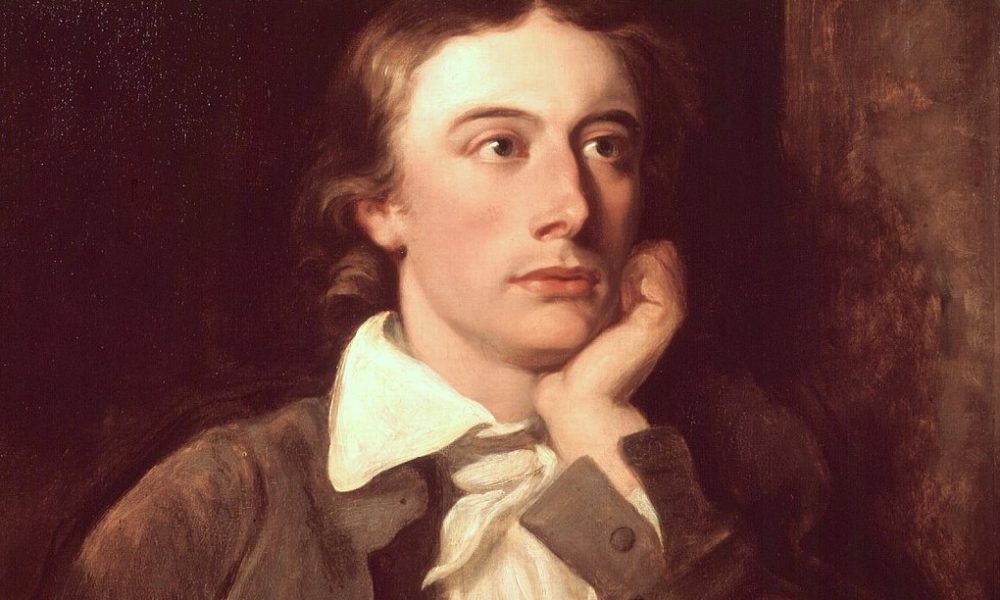| «Джон Китс» |  |
Предисловие: По мотивам стихотворения Джона Китса
«Ода Психее» Богиня я и звукам этих строк внемлю,
Они мне благостны для слуха моего,
Я слышу их, они тихи, под них дремлю,
И чувствую прикосновенье сердца твоего
Ко мне, мой славный, добрый, милый друг,
Я вижу, как крылатая Психея пролетела
Не задев меня своим крылом, мой круг
Друзей хороших, славных, и без дела
Не станет прикасаться с нежностью ко мне
Пылающим костром в большом моём огне.
Рассвет пришёл, невелика его заслуга,
Но с ним пришла моя любимая подруга.
Богиня я и звукам этих строк внемлю,
Я слышу их, они тихи, под них дремлю.
|
Послесловие: Стихотворение Джона Китса
«Ода Психее»:
Внемли, богиня, звукам этих строк,
Нестройным пусть, но благостным для духа:
Твоих бы тайн унизить я не мог
Близ раковины твоего же уха.
То явь была? Иль, может быть, во сне
Увидел я крылатую Психею?
Я праздно брел в чащобной тишине,
Но даже вспомнить лишь смущенно смею:
Два существа под лиственною кроной
Лежали в нежно шепчущей траве;
Вблизи, прохладой корневища тронув,
Журчал ручей бессонный,
Просверкивали сквозь покров зеленый
Лазурь и пурпур утренних бутонов.
Сплелись их крылья, и сплелись их руки,
Уста — не слиты; впрочем, час разлуки
Еще не пробил, поцелуи длить
Не воспретил рассвет; определить,
Кто мальчик сей, — невелика заслуга
Узнать его черты.
Но кто его голубка, кто подруга?
Психея, ты!
К богам всех позже взятая на небо,
Дабы Олимп увидеть свысока,
Затмишь ты и дневную гордость Феба,
И Веспера — ночного светляка;
Ни храма у тебя, ни алтаря,
Впотьмах перед которым
Стенали б девы, дивный гимн творя
Тебе единым хором.
Ни флейт, ни лир, чтоб службе плавно течь,
Ни сладких дымов от кадила,
Ни рощи, где могла вести бы речь
Губами бледными сивилла.
Светлейшая! Пусть поздно дать обет,
Для верной лиры — пробил час утраты,
Благих древес на свете больше нет,
Огонь, и воздух, и вода — не святы;
В эпоху, столь далекую сию
От одряхлевшей эллинской гордыни,
Твои крыла, столь яркие доныне,
Я вижу и восторженно пою:
Позволь, я стану, дивный гимн творя,
И голосом, и хором,
Кимвалом, флейтой, — чтобы службе течь,
Дымком, плывущим от кадила,
Священной рощей, где вела бы речь
Губами бледными сивилла.
Мне, как жрецу, воздвигнуть храм позволь
В глубинах духа, девственных доселе,
Пусть новых мыслей сладостная боль
Ветвится и звучит взамен свирели;
И пусть деревья далеко отсель
Разбрасывают тени вдоль отрогов,
Пусть ветер, водопад, и дрозд, и шмель
Баюкают дриад во мхах разлогов;
И, удалившись в тишину сию,
Шиповником алтарь я обовью,
Высоких дум стволы сомкну в союзе
С гирляндами бутонов и светил,
Которых Ум, владыка всех иллюзий,
Еще нигде вовеки не взрастил;
Тебе уют и нежность обеспечу, —
Как жаждешь ты, точь-в-точь:
И факел, и окно, Любви навстречу
Распахнутое в ночь!
John Keats
Ode To Psyche
Goddess! hear these tuneless numbers, wrung
By sweet enforcement and remembrance dear,
And pardon that thy secrets should be sung
Even into thine own soft-conched ear:
Surely I dreamt to-day, or did I see
The winged Psyche with awaken'd eyes?
I wander'd in a forest thoughtlessly,
And, on the sudden, fainting with surprise,
Saw two fair creatures, couched side by side
In deepest grass, beneath the whisp'ring roof
Of leaves and trembled blossoms, where there ran
A brooklet, scarce espied:
Mid hush'd, cool-rooted flowers, fragrant-eyed,
Blue, silver-white, and budded Tyrian,
They lay calm-breathing, on the bedded grass;
Their arms embraced, and their pinions too;
Their lips touch'd not, but had not bade adieu,
As if disjoined by soft-handed slumber,
And ready still past kisses to outnumber
At tender eye-dawn of aurorean love:
The winged boy I knew;
But who wast thou, O happy, happy dove?
His Psyche true!
O latest born and loveliest vision far
Of all Olympus' faded hierarchy!
Fairer than Ph{oe}be's sapphire-region'd star,
Or Vesper, amorous glow-worm of the sky;
Fairer than these, though temple thou hast none,
Nor altar heap'd with flowers;
Nor virgin-choir to make delicious moan
Upon the midnight hours;
No voice, no lute, no pipe, no incense sweet
From chain-swung censer teeming;
No shrine, no grove, no oracle, no heat
Of pale-mouth'd prophet dreaming.
O brightest! though too late for antique vows,
Too, too late for the fond believing lyre,
When holy were the haunted forest boughs,
Holy the air, the water, and the fire;
Yet even in these days so far retir'd
From happy pieties, thy lucent fans,
Fluttering among the faint Olympians,
I see, and sing, by my own eyes inspir'd.
So let me be thy choir, and make a moan
Upon the midnight hours;
Thy voice, thy lute, thy pipe, thy incense sweet
From swinged censer teeming;
Thy shrine, thy grove, thy oracle, thy heat
Of pale-mouth'd prophet dreaming.
Yes, I will be thy priest, and build a fane
In some untrodden region of my mind,
Where branched thoughts, new grown with pleasant pain,
Instead of pines shall murmur in the wind:
Far, far around shall those dark-cluster'd trees
Fledge the wild-ridged mountains steep by steep;
And there by zephyrs, streams, and birds, and bees,
The moss-lain Dryads shall be lull'd to sleep;
And in the midst of this wide quietness
A rosy sanctuary will I dress
With the wreath'd trellis of a working brain,
With buds, and bells, and stars without a name,
With all the gardener Fancy e'er could feign,
Who breeding flowers, will never breed the same:
And there shall be for thee all soft delight
That shadowy thought can win,
A bright torch, and a casement ope at night,
To let the warm Love in! |
